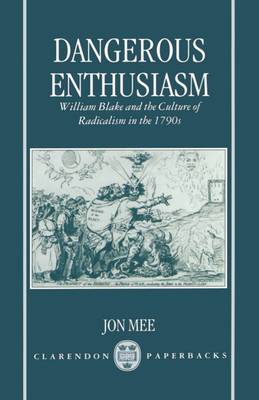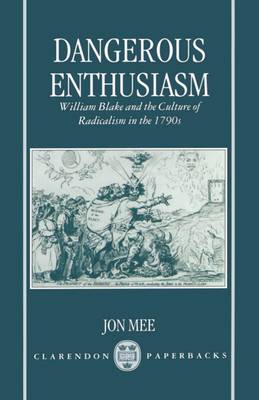
- Afhalen na 1 uur in een winkel met voorraad
- Gratis thuislevering in België vanaf € 30
- Ruim aanbod met 7 miljoen producten
- Afhalen na 1 uur in een winkel met voorraad
- Gratis thuislevering in België vanaf € 30
- Ruim aanbod met 7 miljoen producten
Zoeken
Dangerous Enthusiasm
William Blake and the Culture of Radicalism in the 1790s
Jon Mee
Hardcover | Engels
€ 230,95
+ 461 punten
Uitvoering
Omschrijving
William Blake's work presents a stern challenge to historical criticism. Jon Mee's new study meets that challenge by investigating contexts outside the domain of standard literary histories. He traces the distinctive rhetoric of the illuminated books to the French Revolution controversy of the 1790s and Blake's fusion of the diverse currents of radicalism abroad in that decade. Dangerous Enthusiasm presents a more comprehensively politicized picture of Blake than any previous study. It is supported by a wealth of original research which will be of interest to historians and literary critics alike. Blake emerges from these pages as a "bricoleur" who fused the language of London's popular dissenting culture with the more skeptical radicalism of the Enlightenment. His prophetic books are shown to be less the expressions of isolated genius than the products of a complex response to the cultural politics of his contemporaries.
Specificaties
Betrokkenen
- Auteur(s):
- Uitgeverij:
Inhoud
- Aantal bladzijden:
- 268
- Taal:
- Engels
Eigenschappen
- Productcode (EAN):
- 9780198122265
- Verschijningsdatum:
- 10/12/1992
- Uitvoering:
- Hardcover
- Formaat:
- Genaaid
- Afmetingen:
- 149 mm x 226 mm
- Gewicht:
- 530 g

Alleen bij Standaard Boekhandel
+ 461 punten op je klantenkaart van Standaard Boekhandel
Beoordelingen
We publiceren alleen reviews die voldoen aan de voorwaarden voor reviews. Bekijk onze voorwaarden voor reviews.











